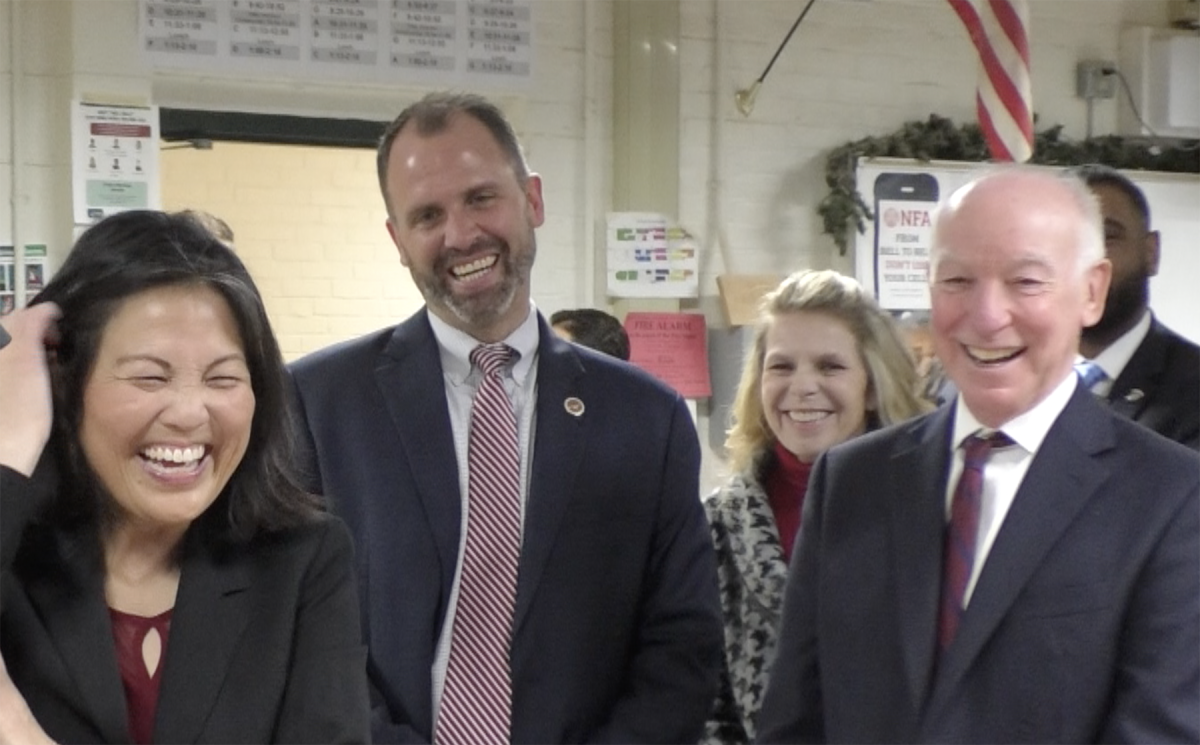Some high schools hold presentations for their classmates and families. NFA? They host presentations for Congress members and Federal secretaries.
As youth workforce pipelines have been recognized and appreciated nationwide, Norwich Free Academy welcomed Acting U.S. Secretary of Labor Julie Su and Congressman Joe Courtney to learn more about the school’s unique youth workforce pipelines.
According to literature produced by the University of Arkansas, workforce pipelines offer a “comprehensive community development model, creating a competitive workforce,” as well as sustainable-employment jobs to graduating students. These programs can look like an in-school class specifically for a certain career path like healthcare, manufacturing, or firefighting.
Students at NFA can choose from several different pipeline programs, one being the Youth Manufacturing Pipeline Initiative (YMPI). Norwich Free Academy became a pilot program for the YMPI in 2017. Since then, 13 different high schools in Eastern Connecticut have adopted the workforce pipeline. Todd Zagurski, technology instructor at Norwich Free Academy, began the pilot program.
“There’s such a massive need for employment in manufacturing that a lot of people don’t know about,” Zagurski said.
High school workforce pipelines target a bigger issue: the lack of American manufacturing. In a country that encourages college, the American blue-collar workforce diminishes. With the younger generation now aging into the workforce, the United States is in need of more manufacturers and “blue collar” workers. Fortunately, NFA offers students the opportunity to gain work experience in school and transfer directly to a secured manufacturing position after graduation, releasing experienced manufacturers into the workforce. Students get a developed understanding of manufacturing, along with apprenticeship hours, OSHA 10 certifications (Occupational Safety and Health Act), and job offers.
The manufacturing pipeline offers students a job as soon as they graduate, without a college education, and helps the manufacturing economy in local communities. Many graduated students from this program work for Electric Boat or local manufacturing companies like Collins and Jewell Company, a prominent mechanical services company.
While presenting to Su and Courtney, William Walker, a 2020 graduate of Norwich Free Academy, said the YMPI “slingshot” his career.
“The goal with these pipelines is to keep people in the area to improve the communities that we live in.” Jessica Vocatura, NFA Director of Student Support Services, said.
“[The program] just helps benefit the community, and only makes it better.” Zagurski said.
NFA currently has several other workforce-pipeline programs, including Emergency Medical Technician (EMT), Certified Nursing Assistant (CNA), Fire Protection services, and the brand-new medical interpreter CNA programs. Students in these pipelines can go directly into the workforce or go to college with credentials or immediately pursue professional work experience after high school, without a secondary education.
NFA Senior Cate Fusaro, a CNA student, has already been taught how to work with patients and communicate in a healthcare setting at local hospitals. Fusaro has also been doing tests done in a laboratory to graduate with CNA certification. Although she plans on becoming a pediatric nurse, Fusaro said, “[The program] gives me the opportunity, starting this summer [to work in] in the healthcare field making more than minimum wage and I’ll always have a fallback option.”
“The beauty of the pipelines is that it gives students who are planning to go directly into the workforce after graduation a pipeline for a sustainable-employment job,” Vocatura said.

